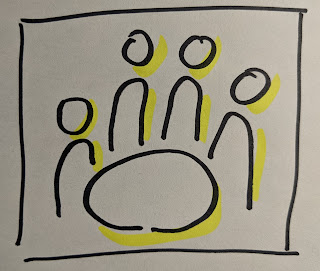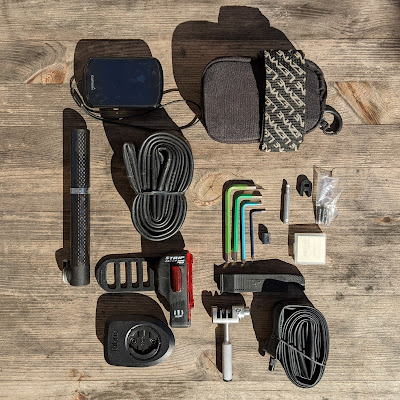
I used to really hate meetings. As a developer they seem to just get into the way of doing real work. You sit in a room with other people who are probably thinking the same thing and you are itching to get back to your desk and do "real work".
But at some point you specialise, teams grow and you need some way to sync up.
Suddenly you realise that meetings are where some decisions are made and you want to join as many as possible.
Because a lot of them are horrible it is natural to want to improve them over time. I am going to describe a bit how I like my meetings and why.
Some of my thinking has changed with being fully remote during the coronavirus crisis, but most of it applies to in person and remote meetings.
An ideal meeting has a facilitator, the minimal length of time, the right attendees, non-attendees not fearing to miss out, everybody being focused and prepared.
A good meeting can be more inclusive for all participants, by allowing everybody to arrive prepared and participate in a meaningful way.
Types of meetings
I separate three types of meetings, they have slightly different rules.
1:1s are the easiest, two people talking about what’s up. There really is not much that can go wrong. Having some items early on the agenda can help both sides to prepare and notes on talking points and action items are definitely helpful.
Structured/moderated meetings, for example retrospectives, lean coffees, daily scrums, brown-bags, presentations or all-hands, have a clearly defined ritual. Everybody is aware about the process. There might be a facilitator pushing through the process or just one person talking to an audience.
Staff meetings, these are the most complicated ones. Maybe it is a brainstorming session, a post-mortem, planning, whiteboarding, sync between teams and everything else. They tend to be the ones that can feel like a waste of time with the only action item being another meeting.
Scheduling
Meetings should be a bit shorter than the full hour or half hour, to leave some space between them. This is especially important with fully remote teams, as you don’t have the chance to refocus a bit when travelling between rooms and maybe grabbing a tea on the way.
I like the idea to start meetings a couple of minutes past the hour and end them a bit before, but realistically people tend to prefer meetings to start on the hour. So now I just set them to the fuzzy length of Google Calendar (50 minutes, 40 minutes, 25 minutes).
Just setting this in the calendar is not enough though, it is the job of the facilitator to make sure it ends on time.
A lot of meetings are probably recurring. It is easier to put them into your schedule, timeboxing is easier as they can overflow in the next occurrence and participants are gelling as a team over time. You want to keep them repeating at the same time and avoid cancelling them, the larger the group the more important this is.
Sometimes you might need to cancel a meeting. Again this is easier for smaller and frequent meetings (weekly 1:1s for example). The bigger the meeting the earlier you should notify participants as they probably have planned their day already around this and ideally prepared for it.
Size
There is this lore at my current job about how I think that meetings with more than four people are a waste of time. I might have said something along those lines after coming out of a meeting with twelve people. So there might be some truth to it.
As with teams there is a certain sweet spot for meeting participants. You want to get enough input to create an interesting discussion, you want enough stakeholders to allow syncing up, but you also want a small enough group that everybody can contribute in a useful way.
A brainstorming session with fifteen people is indeed my personal hell.
The exception again are structured meetings, which can scale up to the whole company.
Before the meeting everybody should also be able to make an informed decision about attending and their role in the meeting. Do I have to be in the meeting? Is someone else maybe covering my role already? Do I just want to listen in, but not take part in the discussion? Would your presence reduce the value for everybody else in the meeting? Are you a manager and are just taking part because of a worry of losing control?
Facilitator / Moderator / meeting lead
Every meeting needs someone to take the lead. Usually it is the person who sets up the meeting, because they should have the greatest interest in making the meeting successful.
Their job is to keep it on track over the whole time, see that everybody has a chance to contribute and fight off any possibility of going off the rails.
Meeting Agendas & Notes
I am kind of a split personality on meeting agendas and notes. I love to have them, but I hate to write them. But they should exist at least in a minimal version. You want to give everybody a chance to prepare for the meeting.
Agendas and notes are also a good way to fight MFOMO (meeting fear of missing out). With open meetings people can decide before if it really makes sense to join and if they can contribute to these. And once you can rely on meeting notes it is also enough to check these after the meeting to stay informed.
One low effort way we are using are simple Google Drive documents for repeating meetings (all-hands and guild meetings), which are ordered in reverse chronological order.
On the top you will always see the current or next meeting and everybody is invited to add items to the agenda. For guild meetings this is just a bulleted list, for all-hands it is a template with sections for bigger items like kudos and Q&A. Often people directly attach their name to the items to make it clear who is taking the lead on these.
During the meeting we add comments, decisions and action items. These then can be reviewed by everybody and again in the next meeting.
For remote retrospectives and lean coffees there are good tools like Retrium to help keeping notes and facilitating them. You can also use them for post-mortems or other meetings which lend themselves to the “post-it in columns with voting” kind of meeting.
Remote Meetings
Quite unexpectedly we are all fully remote during the coronavirus crisis. On the one hand this is better than hybrid meetings with some people being remote, but on the other it is also worse than fully in person meetings.
Your camera should be on. You are sending so many signals with your body and face that just can’t be replicated just through voice.
There is a reason why people get into fights so easily on Twitter or Slack over trivial things that wouldn’t be an issue if they met in person.
If you are an introvert like me and tend to think longer before you say something it will also be easier to spot by the facilitator.
In an all-hands meeting or if you are only a spectator and not participant it can also be OK to switch off your camera and microphone as a signal of this.
If you are in a noisy place you might want to mute your audio whenever you are not speaking. Unmuting can then also be used as a signal to the facilitator that you want to say something.
I upgraded my video conferencing setup quite a bit because I expect this home working to last a bit longer, but this is not necessary. If you have a reasonably good connection and a modern laptop or webcam you are probably fine.
Etiquette
Every meeting starts on time. You might be a bit more flexible for 1:1s and all-hands meetings.
I personally wait up to 10 minutes in 1:1s and 5 minutes in all-hands.
Any other meeting starts on time, you don’t wait for stragglers and waste the time of everyone else. You don’t try to track them down on Slack. You also don’t rehash everything that happened so far for them once they join and again waste time for the group.
There is no place for laptops or mobile phones in meetings. When remote this is probably a lost cause as everybody has all the distractions of the world right on the same screen as the video call.
Take the time to focus on the other people in the room, the conversation, the presentation, the whiteboard.
If you are checking Slack, email or reviewing code, you are just showing disrespect to everybody else in the room who made the time to focus on solving a problem.
Food in meetings… nobody wants to watch you eat. If it is an all-hands meeting, then switch off your camera and go ahead and feast. In an in person meeting just the smell is probably distracting enough for everybody.
References
I am not the only person worried about meetings, there are lots of good resources out there. I collected some here.
Rands is obsessed with meetings and has a couple of good posts about these
Atlassian talks about making meetings more inclusive: How to counteract 3 types of bias and run inclusive meetings
Zef about laptops in meetings: On Paper Or: how not to look like a dick in meetings
Two interesting podcasts about meetings
Final Words
I don’t hate meetings any more, but I definitely don’t love them either.
I believe with a bit of practice you can make them better and less painful for everybody.




